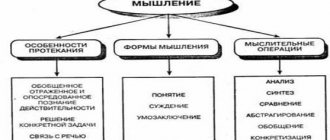Own interests, desires and freedom of choice
A person deprived of freedom of choice is a slave, a slave of circumstances, people, relationships, and who knows who else and what. But few people think about the fact that slavery can be voluntary, yes, yes.
For example, a child is born, and parents, striving to be “ideal,” subordinate their lives to the interests of the child.
This sometimes happens both in marriage and in business relationships, as soon as a person sacrifices his interests in favor of the interests of another person, and does this on a regular basis and pushes his own desires and needs into the second, third and tenth plan - immediately there comes a moment of smooth his transition from a clan of free people to a clan of dependent people, burdened with circumstances, troubles and worries.
I can already imagine your surprised look, my dear reader. But the whole point is that if your desires and interests cease to be important to you, then how can they be important to anyone else , right?
- A man sells his bicycle because he simply does not have time to ride it, his life is subordinated to the life of his wife and children.
- But the wife cannot afford to leave the children with her husband and go to the salon, yes, and this is all on a voluntary basis.
The price to pay for such a careless attitude towards one’s freedom, desires, and interests is the loss of resources, a depressed and broken state, and embitterment. And over time, the one for whose sake all this was started, well, the one for whose sake both freedom and interests were trampled, appears either as a debtor or as a monster.
So what pushes a person to such betrayal of himself?
The answer is simple and complex at the same time. These are subjective attitudes such as think about your homeland first, and then about yourself, or disappear yourself, but help a friend, and so on... Or an irrepressible feeling of guilt and shame for your happiness, by the way, this is also a consequence of these very limiting beliefs.
But few people realize that only those relationships can be considered happy and productive when the interests of everyone are taken into account, and not just one of all, where people understand that it is important to replenish resources and that by sacrificing their interests, even of their own free will, the resource of another can be replenished, but at what cost?! And besides, what’s the point if he immediately refused anything in your favor?! What are these sacrifices for?
Instilling respect for desires, choice and human freedom begins in early childhood, when a young family member begins to learn that dad likes to sleep on a big bed, and mom likes to sit with a cup of coffee and a book, and little sister likes warm milk in the evening, and he himself likes play with legos in the morning - and that all these desires are important!
Remember the words of the poem: ....And I said to the beam - I also want to move, But my mother is sleeping, she is tired, so I didn’t play, I don’t start the top, I sat down and sit... / E. Blagina
Yes, everything is so only in a situation of lack of resources: moral, spiritual, material, where we are talking not about life, but about survival, a person becomes a slave to cramped circumstances.
Just guess what? Normally, a person looks for ways to satisfy his needs and desires, he defends his interests, no, without infringing on the interests of others - he looks for opportunities for himself, you know? And the one who searches will definitely find it, that’s how the world works!
After all, another version of the plot of the verse is possible, right? After all, mother and daughter could search and find an alternative solution where the interests of both mother and daughter would be taken into account, right?
S. Covey in his book “The Third Alternative or the Solution to Life’s Most Difficult Problems”, and Feller in his book “Secrets of Happy Families, a Male View” described exactly how this process of matching interests and desires occurs. I recommend it to everyone who finds the topic I raised relevant.
Increase your resources, cherish your interests, show your will, be happy and fruitful!
Interest as a need attitude that encourages cognitive activity.
⇐ PreviousPage 9 of 10Next ⇒
The highest level of development and manifestation of cognitive motivation is cognitive interest ,
which represents a complex organic unity of intellectual and emotional-volitional processes that act as a motivating force for active learning.
The problem of cognitive interest goes back deep into antiquity. Socrates also emphasized the importance of students having cognitive interest in the learning process. This idea was developed in the works of ancient Roman philosophers, and then in the works of the founders of didactics: Ya.A. Komensky, I.G. Pestalozzi, A. Disterwega, I.F. Herbart. So I.F. Herbart gave a classification of interests in which he reflected not only their qualitative characteristics, but also the dynamics of development relative to the age of students. Considering the two main sources of knowledge - experience and communication, he identified, respectively, two groups of interests: interests arising from experience (empirical, speculative, aesthetic) and interests developing through communication (sympathetic, social, religious).
The problem of cognitive interest was raised especially acutely in the works of many progressive theorists and practitioners of Russian pedagogy of the 19th century: N.F. Bunakova, V.P. Vakhterova, K.N. Ventzelya, N.A. Korfa, P.F. Kaptereva, L.N. Tolstoy, K.D. Ushinsky and others.
So, P.F. Kapterev was one of the first in Russian pedagogy to attempt to classify the types of cognitive interest and identified the following:
· physical interests (propensity for games, sports, hunting, traveling);
· mental interests (interests in facts, their understanding);
· aesthetic (interest in art in its various types and manifestations);
· social (family, comradely-school, social-national, universal);
· volitional (interests in skills and actions, personal and social self-government).
Cognitive interest is realized through cognitive need, initiative, cognitive activity, self-actualization and self-regulation, which are its defining characteristics.
Cognitive interest is associated with the emotional-volitional sphere of the individual (purposefulness, organization, independence, determination), since its implementation requires moral-volitional mobilization, the student’s attitude to solve complex problems, and the desire to realize their cognitive capabilities.
Cognitive interest is realized in educational and cognitive activities and, thanks to practice, becomes a habitual form of behavior. At the same time, the formation of the student’s procedural sphere, determined by the system of formed knowledge, abilities and skills that allow him to achieve qualitatively new results in a certain type of activity based on the rational application of forces within a given time, is of decisive importance.
Thus, we can conclude that cognitive interest has external and internal sides. External is the effectiveness of learning, determined by the totality of knowledge, skills and abilities of the individual. The internal side consists of the need-motivational sphere, the mental, physical and moral-volitional efforts of the student aimed at achieving the learning goal, the desire to realize their cognitive capabilities.
The presence of cognitive interest is manifested in the following signs characteristic of the student’s educational activities:
- consciously singles out some subject as his favorite, actively participates in the lesson, independently and willingly prepares reports and messages;
- connects the study of this subject with his future profession, shows increased activity when studying individual sections, and willingly completes additional tasks;
- when explaining new material, quickly understands the essence, is able to detect and explain the relationship and interdependence of phenomena, is not content with ready-made answers, looks for theoretical justifications, and actively participates in the discussion of problematic issues;
- quickly navigate the application of theoretical knowledge in practice, seek explanations for new phenomena and contradictory facts;
— love research-based work, discover creative problems themselves and are actively involved in solving them;
- strive for self-education, read a lot of additional literature, follow new publications, and independently compile abstracts of what they read.
Since cognitive interest is a complex personal formation, certain conditions and types of activities are necessary for its successful formation during the educational process.
Among the conditions for the formation and development of cognitive interest
students are identified as follows:
- posing problematic questions with clearly expressed contradictions that attract attention and force one to more actively comprehend what is heard;
- introducing problem tasks with showing several solution options and giving students the opportunity to think about which one is correct;
- involving students in an independent search for ways to solve a problem that will be considered in the next lesson, or vice versa, in an independent analysis of special cases arising from the solution to the problem obtained in the lesson;
- setting up problem tasks that help indicate students’ lack of knowledge necessary to answer these questions in order to arouse interest;
- selection of educational and cognitive tasks of a creative nature, the implementation of which can only be accomplished by a student by showing a non-standard approach, imagination and creativity;
- encouraging students to analyze phenomena and factors (theoretical explanation), as a result of which contradictions arise between existing knowledge and new knowledge, between understanding the importance of the problem and the inability to approach its solution;
- use of educational and life tasks that arise when performing tasks, i.e. taking into account the personal experience of students;
— use of research tasks with different levels of problematic and creative orientation when organizing independent work and doing homework;
- varying and reformulating the conditions of the task to be performed in order to cover all students with independent work, depending on the level of their individual training;
- use of interdisciplinary connections during the lesson;
— providing students with the opportunity to demonstrate mental independence and initiative;
— use of active teaching methods, problematic issues, situations and tasks;
— conducting training at a high but feasible level of difficulty;
— the presence of sufficiently (but not excessively) diverse educational material and teaching methods;
- the use of emotionally charged, living words of the teacher.
Significant activity
in the course of the formation of cognitive interest is extracurricular educational work, which is carried out by the subject teacher with a certain degree of priority:
· regularly (subject clubs and sections, club meetings, literary lounges, etc.);
· periodically (olympiads, subject weeks, exhibitions of students’ creative works, competitions, theme evenings, oral journals, etc.).
The variety of forms of extracurricular educational work is constantly enriched in accordance with changes in social conditions and the specifics of school life. Often their content and methodology are borrowed from popular television shows (KVN, “Round Table”, brain ring, “Field of Miracles”, “What? Where? When?”, “Clever Men and Clever Girls”, “Marquise”, “Auction” and etc.).
At the same time, it is necessary to remember that the cognitive interest of students in the course of extracurricular educational work will be formed if they are not purely entertaining in nature. It is necessary that any extracurricular activity enriches children with new knowledge and gives them confidence in their own abilities.
⇐ Previous9Next ⇒
Recommended pages:








